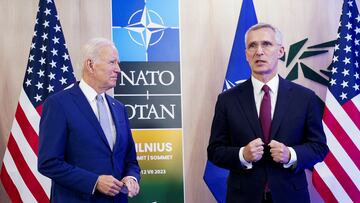What are the differences between NATO, the UN and the EU?
All three are entities with great power at the international level, but there are multiple differences between their functions and their origins.

The conflict between Russia and Ukraine is not only played out in Ukrainian territory, but also at an institutional level, with important international organizations taking on a major role. This is the case of the North Atlantic Treaty Organization (NATO), the United Nations (UN) and the European Union (EU).
There are multiple differences between NATO, the UN and the EU - from their origin, to their method of solving problems, to their influence over international conflicts.
The UN
In the case of the United Nations, founded in 1945, with headquarters in New York and 193 member states, it has a deep-rooted social character. One of the main objectives of the UN is to enforce human rights, guarantee international peace and security, defend international law and distribute humanitarian aid wherever it is needed.
The UN, unlike NATO and the EU, plays a mediating role in international conflicts. With regard to sanctions, unlike the EU, it is more influential, as it has the necessary legal instruments to impose restrictions on those countries it considers a danger to global peace and security.
NATO
While the UN has a more social profile, that of the North Atlantic Treaty Organization is based on military cooperation. Also known as the North Atlantic Alliance, it is currently made up of 30 countries and provides military support to member states that are attacked by other nations. Founded in 1949 and headquartered in Belgium, in article five of its treaty, it explains that an attack on one of the countries in the alliance is an attack on all of them, and that a response is mandatory. The main difference with respect to the UN is its form of organization.
The EU
Meanwhile, the European Union is a geopolitical entity that covers much of the European continent. It is an economic and political association formed by 27 countries with a single currency. The Union seeks to guarantee the security, stability and prosperity of its citizens, as well as respect for human rights.
However, it does not have the sanctioning capacity of the UN, and it is not a military cooperation organization in the same way that NATO is. Many of the EU member countries are part of the North Atlantic Alliance.





